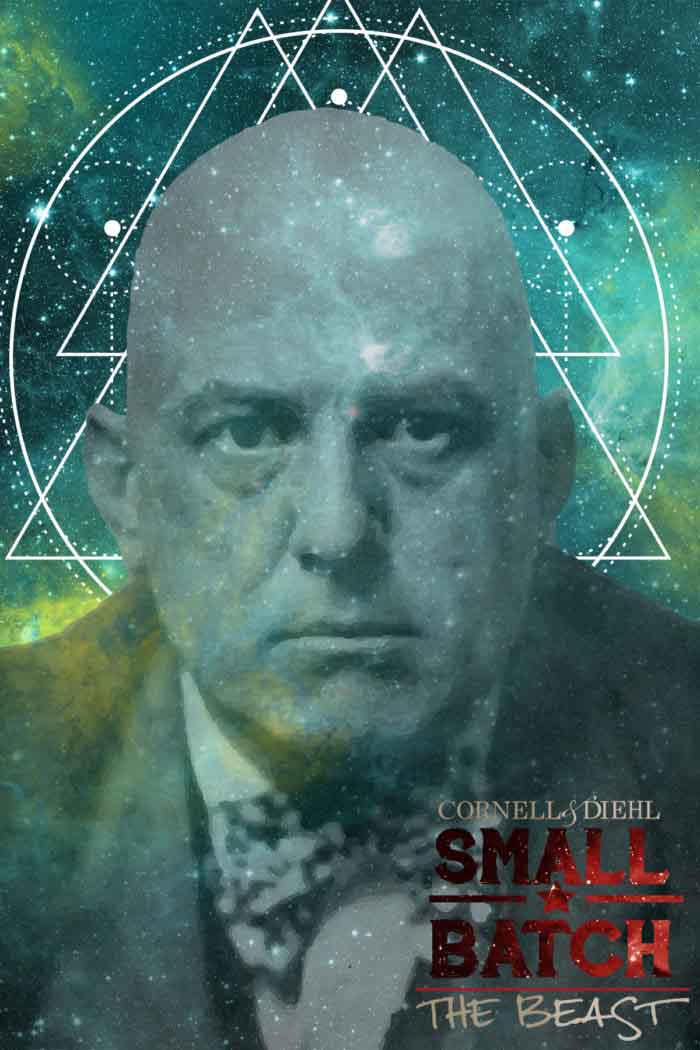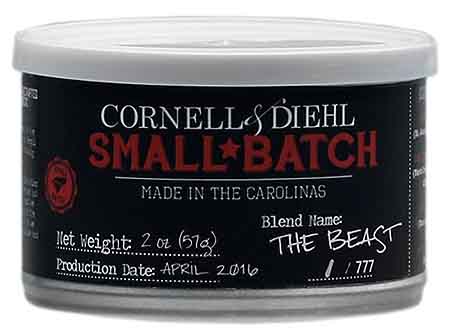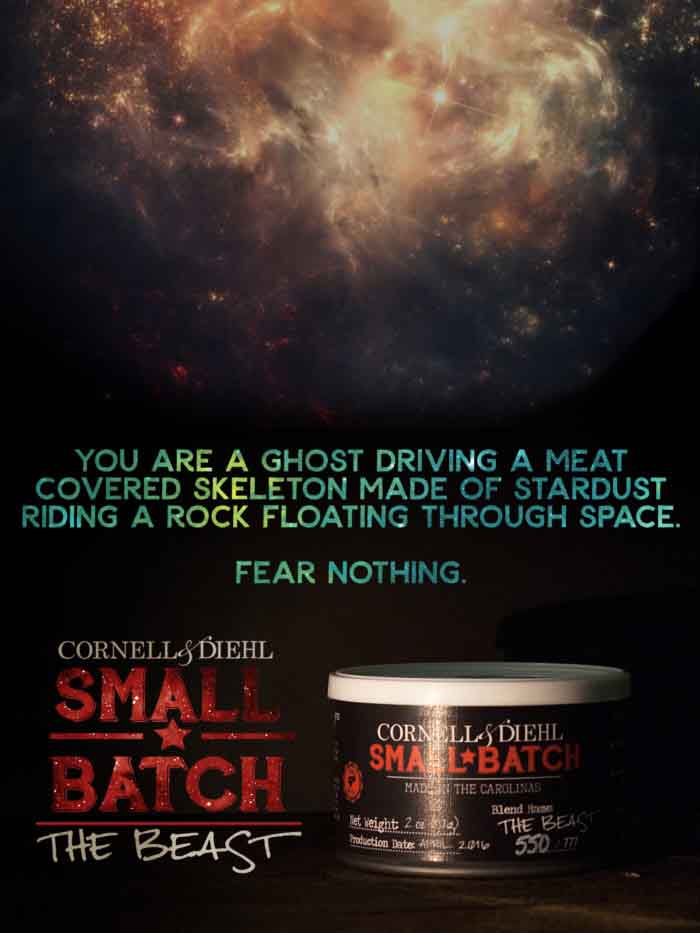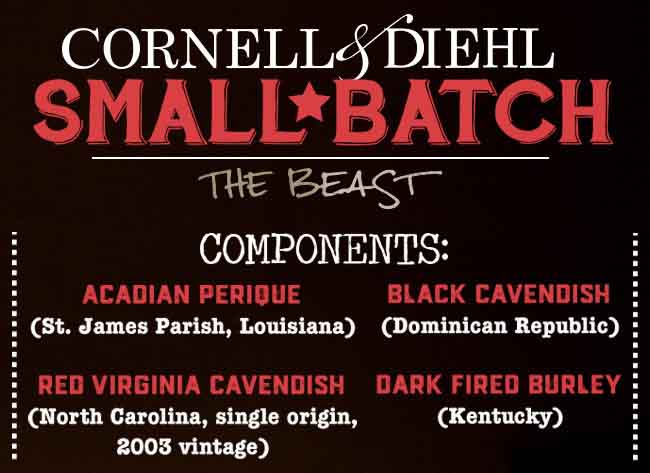
This interview was completed with Blender Jeremy Reeves, Adam O’Neill and Ted Swearingen.
Like many Hessians, I enjoy Nicotine, not only for its calming mental state but for its cognitive benefits. While I love cigarettes, snuff, chew, cigars and cigarillos, my ultimate love is the pipe: a method of absorbing Nicotine slowly, with maximum flavor, that rewards the contemplative mind.
As a result, I have become a fan of not only Cornell & Diehl tobacco blenders, but also occultist Aleister Crowley’s blend of “rum soaked Perique” which he smoked to prepare for mystic rituals. When I heard that Cornell & Diehl’s new “Small Batch” division was planning on releasing a Crowley-themed tobacco named The Beast, I reached out to the C&D blenders with a few questions about the worlds beyond, heavy metal and pipe tobacco.
Cornell & Diehl is releasing a new The Beast tobacco blend. Some have said this is just an extended April Fool’s joke. Is it for real? When does it come out?
The Beast is certainly for real, and will be C&D’s second Small Batch release. There will be 777 tins made, and the official retail release date is April 29th.
What will The Beast be like, and will it feature tribute to Crowley’s lore-famed mixture of rum-soaked Perique?
The Beast is quite powerful and very heavy, being mostly Perique, and the whole blend has been soaked in rum for 7 days. It is undeniably Crowley inspired, and that in and of itself is our tribute.
Have you ever smoked rum-soaked Perique straight and if so, what did you think of it? How will The Beast compare?
I have and honestly I rather enjoyed it. I actually smoke our long-cut Perique straight occasionally on my drive home. If you puff like a freight train, it will knock your socks off, but if you just keep it simmering, the depth of flavor is mesmerizing, and the nicotine is slow to come on and builds nicely.
The Beast is a powerhouse, but it is not straight Perique. I like to think that we have tamed the beast a bit.
How long does it take you guys to invent a new blend recipe? Is there a lot of trial and error? What’s the most fun part?
That all depends on the specific blend in question. I always make several versions of a blend and try different approaches or methods. Sometimes I get it in the first few tries, and sometimes it takes weeks or months of experimentation. There are two blends that I have been working on for about 6 months, and they are getting close to completion but still aren’t quite right.
In the case of The Beast, Ted Swearingen and I collaborated on the blending. We each came up with several recipes and then smoked through the lot together with Shane Ireland and Sykes Wilford. What a time that was! Four guys in a little room smoking seven different versions of this really heavy, rum-soaked Perique blend for about an hour. By the end of it, we all were glazed over, dazed, sweating, and dizzy!
With the new C&D “small batch” line, you’re trying something different. Is this a way for C&D to “test the waters” with new blends? About how much of each small batch do you initially produce?
Yes and no. I don’t necessarily think of Small Batch as a way to test the waters for large scale production, but rather a way for us to be creative and try new things without having to commit to a blend that may be too niche to produce on a more permanent basis.
The C&D line is quite large already, so this model gives us more freedom to try things that might be be difficult in regular production or to use special ingredients that are in limited supply. The possibilities are a lot more open in Small Batch, because we are only going to make the blend one time.
The first round of Small Batch was “Straight Up English,” and we did 400 tins. They all sold in two hours. There will be 777 tins of The Beast released. Next time? That’s anybody’s guess.
Did this approach grow out of a previous marketing strategy by C&D? It seems like you were very adventurous in putting a lot of blends out there and seeing what “stuck” with the audience. How do you know if a blend “sticks”?
That’s actually a remarkably pertinent question given that The Beast is coming out under our Small Batch label. Our main vision for this line was to be able to be more flexible and creative in the blending process without having to commit to production of a large run. In the case of Straight Up English, we’d received some particularly good bright Virginias from Canada and wanted to showcase the interplay between those leaves and Latakia. In the case of “The Beast,” we just wanted a chance to tinker with Crowley’s famous blend, which is an idea we’d always toyed with, but we could never do before now.
As for whether or not a blend “sticks,” we use a combination of feedback and sales. Some blends might not sell so well, but get a lot of positive feedback. In these cases, we’ll usually just scale back production and keep the blend around.
When your team designs a blend, how do you handle the balance between “I would like this” and “our customers would like this,” or are the two very similar?
My approach is to blend things that taste like I want them to and then to consider whether there is broader appeal by taking it around the office and getting feedback. With a quite diverse group of pipe smokers with varied style and taste preferences all in one building, this approach helps me to hone ideas, improve blends, and gain insight into what other members of the pipe smoking community might think of whatever the blend in question might be.
Did you read any Crowley, practice any rituals or listen to any occult-influenced tunes during the invention and production of the blend?
Ted has read quite a bit of Crowley’s work, including The Book of Law, The Book of Lies, The Book of Thoth, and Liber 777 — the title that inspired the number of tins for this blend.
There was not enough room in the production area to make a proper altar, and not enough time in the work day to draw a sigil, but I listen to a lot of occult inspired music of many different genres. Pentagram, Diecide, Asphyx, Possessed, the Devil’s Blood, Celtic Frost, Bathory, Diamanda Galas, Skip James, Iron Maiden, Axe, Black Widow, Sabbat, Black Sabbath all find their way into my regular listening rotation.
Why a tribute to Crowley? Will you be doing tributes to other “interesting” writers?
It seems that Crowley’s idea of smoking Perique soaked in rum in order to reach an altered state for the purpose of performing the dark arts has really resonated with a number of people in the pipe community, inspiring many to try it, and many more to talk about it with varying tones of trepidation, disgust, or fascination.
We wanted to do something that was evocative of Crowley’s mixture but would also be a little tamer and more interesting than just Perique and rum.
I can think of no other author who has inspired such an intriguing bit of pipe lore than Aleister Crowley. That said, you never know where our next inspiration might spring from.
I write for the net’s oldest underground metal site and our audience are rabid death metal fans. Do you all listen to any heavy metal or death metal over there, especially when mixing up Perique? Why should a death metal fan adopt the pipe?
That’s really cool to know! I will have to check out your site!
As I mentioned earlier, I do listen to a lot of metal, and old school death metal is some of my favorite music. Cancer, Disembowelment, Death, Slayer, Onslaught, Monstrosity, Exhorder, Goreguts, Cannibal Corpse, Pestilence…. not counting my physical collection, digitally I have over four months of music, and I’d guess that about 60% of that is metal of various styles (doom, thrash, death, tech, grind, classic, prog, shoegaze, etc.). A couple of the other guys here listen to metal as well.
I think that pipe smoking goes beautifully with classic doom like Candlemass or Solitude Aeturnus, or even the sludgy kind of stuff like Crowbar. I find that I have to concentrate a bit more on keeping my smoking cadence slow if I am jamming to something really speedy like Origin or Pig Destroyer.
How did you get into smoking pipes, blending and eventually working for an innovator like C&D?
Really, that all started in 2003, when I took a position as a sales clerk at a cigar shop in Chicago called Blue Havana. The owner of the shop rented a number of properties in the area, and as it turned out, one of his tenants was our shop’s Lane sales representative, Jeff. I smoked cigars and cigarettes at this point, but Jeff was a dedicated pipe smoker and gave me my first pipe, an old Stanwell sandblasted Billiard that was well smoked.
This pipe and Jeff’s careful tutelage really started my curiosity and interest in pipes and pipe smoking, but it wasn’t until I left that position in 2006 and went to work at Iwan Ries that pipes really clicked. I have always been an adventurous smoker, always looking to smoke something new, and Iwan Ries certainly offered more pipe tobacco and pipes in one place than any other shop. Suffice to say, I tried as much as I could get my hands on. It was also while employed at Iwan Ries that I first became aware of the greater pipe smoking community, eclectic and strange as it is. This was also the first time that I became aware of Smokingpipes.com.
When I left Iwan Ries in 2007, I went back to working in restaurants, and when I left Chicago to move to Portland, OR, Smokingpipes became my primary source of pipes and pipe tobacco. I was continuing to work in food service, making wood-fired pizza at Pyro Pizza. We were using local ingredients, making our own mozzarella, butchering, and curing our own meats, making our own sodas, growing our own herbs, etc. I had always cooked from a young age, but this was really creating food on a whole new level. I also had the opportunity to build two wood fire ovens for the company, which was really cool.
After a few years at Pyro, I learned of a job opening at Smokingpipes and decided, at the urging of my girlfriend at the time, to apply. They called me the next day, and a week later I flew to South Carolina to interview. I was hired in the Customer Service department for Smokingpipes.com. Cornell and Diehl had become my favorite blending house, and I was delighted to learn that they were merging with Laudisi, SPC’s parent company. Later it came to light that when C&D was to South Carolina, head blender Ted Connolly would be taking retirement, and toward the end of 2014, I was offered the position as his replacement, which I gladly accepted.
I began traveling to Morganton to train with Ted C. and the team in the beginning of 2015, and in May of that year the company relocated to join the rest of Laudisi in the new facility, located in Longs, SC. That’s the condensed version, anyway.
If people like what you’re up to, how do they follow your activities and those of C&D online? Is there a C&D tobacco you’d recommend to start with?
We’re pretty active on all of the usual platforms — Instagram, Twitter, Facebook, and YouTube — plus, as you know, we tend to lurk around the forums.
New pipe smokers tend to roll with Aromatics when they first start out. As such, Autumn Evening (by far our most popular Aromatic) is perfect for newbies, as it smokes dry and cool, which means less relights and tongue bite. Plus it has the same unique red Virginia Cavendish we’ve used in The Beast, only with a topping of boozy maple.
5 CommentsTags: adam o'neill, aleister crowley, cornell & diehl, perique, pipe tobacco, ted swearingen, tobacco blends




